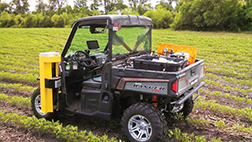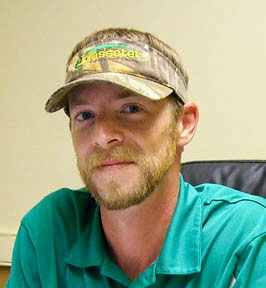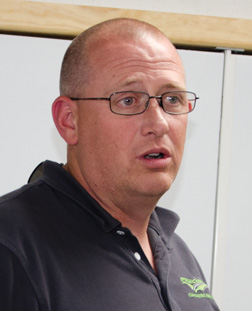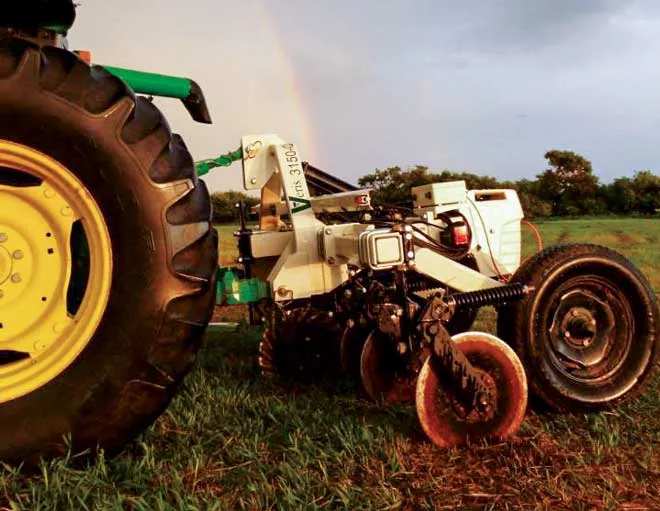Pictured Above: Although soil sampling is traditionally the job of independent agronomists, consultants or crop input retailers, adding the service to a dealer’s suite of precision options may add revenue and unique sales opportunities. Photo Courtesy of Veris Technologies
Retail sales and service of farm equipment have always been the bread and butter for dealerships. But some are still coming to grips with the fundamentals of selling precision farming components to their customers.
For this reason, capitalizing on delivery of agronomic and data management service offerings may feel like a daunting task. However, the opportunity to add a new layer of revenue to the dealership, especially in the current economic climate, is significant and many retailers are taking the leap.
This feature is the final in Precision Farming Dealer’s three-part series (the first and second appearing in our Winter 2016 and Summer 2016 print issues, respectively) tracking the transition of farm equipment dealerships into agronomic and data management services. In this conclusion, we explore how several dealerships successfully added soil sampling and testing services to their suite of precision offerings.
Soil sampling services, traditionally the realm of independent agronomists, consultants or input retailers, may initially seem out of place when it’s being offered by a dealership. But as recently as 2015, more than 30% of dealers responding to Precision Farming Dealer’s annual benchmark study said they included soil sampling among the precision services they offered.
As more precision farming equipment designed to collect increasingly varied farm data is sold to customers though, offering assistance in analyzing that data becomes more natural.
Structuring the Service
As with all services, there are many possible ways to format the offering. One would think that to offer soil sampling, a dealership would need to acquire a soil sampling rig, hire staff to operate it, have an agronomist to analyze the data and provide recommendations and acquire the appropriate software to transfer the data. This is certainly one way to do it, but it’s not the only way.
Eric Lund, president of Veris Technologies Inc., a manufacturer of soil testing and mapping equipment, says the dealers who have the most success offering the service are the ones who go into the endeavor with a solid operational plan.
 |
|
Paul Bruns, owner of Precision Consulting Services in Canby, Minn., has been offering soil sampling services since 2004. He still does a fair amount of hand probing on ATVs, but he bought this Wintex rig mounted on a Polaris Ranger to help with operator fatigue, sample consistency and efficiency. Photo Courtesy of Precision Consulting Services |
“With equipment dealers offering our mapping, the most successful ones are the ones that most clearly defined what their mission was,” says Lund. “If they were going to do the agronomy, then they have an agronomist on staff or if they just planned on collecting the data, they set themselves up for that. Dealers that just grab a unit and then see if there is any interest aren’t as effective.”
PrairieLand Partners Inc., a 9-location John Deere dealership group in central and southern Kansas, decided that the best route to offering soil sampling services for them was through partnering with an existing independent provider in their area called Heartland Soil Sampling (HSS).
“We started the business relationship about 3 years ago,” says Integrated Solutions Manager, Steve Kaufman. “HSS pulls the samples for us and has them analyzed, then our on-staff agronomist will provide the customer with recommendations. It ties directly into our data management services that we offer our customers.”
Dealer Takeaways
Partnering with a soil sampling service provider already in business can jumpstart the dealer’s program with minimal upfront investment.
Packaging soil sampling services into multi-year plans helps keep costs predictable for customer and dealer, and it also helps manage workflow.
Among other things, a soil sampling service is another contact point with customers that may grow into an equipment sales opportunity.
Kaufman notes perhaps the best part of the arrangement is that upfront investment costs were little more than a handshake. HSS assumes all the equipment and manpower costs of obtaining the sample and provides PrairieLand with a simple per acre charge that they can hinge their own mark up to. The dealership’s agronomic specialist, Rob Meyer, says they can afford to make their margins tighter because using a contractor to complete a large portion of the job helps keep costs predictable.
“Instead of having all the costs in the field with equipment, manpower, maintenance and software, we have one simple cost to build the service around. We’re not going to have to worry about the equipment breaking down and having to invest more money,” says Meyer. “HSS also has access to a much better volume discount with the lab they send it to than we would have been able to get, so we’re able to be competitive there as well.”
Meyer points out that the dealership also already tends to be busy during the peak sampling seasons, so contracting the work out helps ensure that it’s done in a timely fashion and it avoids a manpower surplus on off seasons.
Another way to offer soil sampling services while controlling costs is to rent the equipment to customers. Lasseter Equipment Group, a 7-store John Deere dealership group in Georgia, purchased a Veris 3100 soil electrical conductivity sampling rig about 7 years ago and has been leasing it to its customers through a per acre fee ever since.
“They can have their own agronomist or consultant process the data if they want afterward, or our on-staff agronomist can do it for them too. We give the customer control of what they want,” says Dusty Engel, Lasseter’s Integrated Solutions manager. “A lot of customers want to do it themselves, but buying their own rig just wouldn’t be economical because they’d probably only use it once a year.”
Lasseter Equipment’s investment in the service included the sampling rig, a few adapter harnesses and the manpower to provide recommendations from the samples. When they first purchased the rig, they were able to contract out the agronomy work to a consultant they worked closely with, but they’ve since brought on a full-time agronomist.

"A lot of customers want to do their own sampling, but buying their own rig just wouldn’t be economical because they’d probably only use it once a year..." — Dusty Engel
Engel notes that although having an agronomist on staff has made offering the service fairly simple, remaining flexible with manpower is key. They’ve increased the volume of acres sampled from 3,000 the first year to nearly 35,000 in 2016, so having enough staff to accommodate growth is essential.
“If you do a lot of the work in-house, just make sure you have the manpower for it,” says Engel. “On the other side of that, if you bring on extra staff, you still have to keep them busy during slow seasons. There are two other employees in our precision department and we’re actually all working together now to get out certified crop advisor (CCA) licenses so everyone is a little more flexible and we have that much more accreditation.”
When looking into the first stages of offering a soil sampling service, it pays to take a page from an independent consultant on how they structure their operations.
Paul Bruns, who owns Precision Consulting Services in Canby, Minn., says getting the right equipment has made all the difference for his business. Bruns has been offering soil sampling services since he started the precision dealership in 2004.
“We run a Wintex 1000 rig mounted on a Polaris Ranger, but we also do some hand probing on ATVs,” says Bruns. “We didn’t get the soil sampling machine until about 3 years ago, and it helped out tremendously with operator fatigue, sample consistency and efficiency.
“There is maintenance involved, but the speed was a good trade off. There are a lot of options out there for samplers, and you have to look to see what works best for your conditions. What we did was use the Wintex for a month trial so we could see how it performed on the job.”
Packaging Services
Deciding how to market the service to customers and how to set prices on packages can make or break the venture’s success. Again, pricing services like these may not be a particularly familiar process for dealerships. Lasseter Equipment looked to its local independent soil sampler for some clues.
 |
|
Eric Lund, president of Veris Technologies Inc., says the dealers who end up doing best with his company’s products are the ones who decide early on whether or not they will offer the actual labor of collecting samples, the agronomist recommendations or both to their customers. Having a well-drawn out mission seems to be tied to better success providing this niche precision service, he says. Photo Courtesy of Veris Technologies |
“There’s a local crop consultant with her own Veris rig who we actually work very closely,” says Engel. “It’s a bit of an odd arrangement, but we decided to adopt her exact pricing to help us establish a sort of working relationship with her and get us up to speed. Everything with the service has a per acre charge.”
Engel says that even though they are technically competitors, the relationship is so tight that they often lend one another sampling rigs if one of them gets swamped.
“We decided early on that it was better to work with people locally rather than against them,” says Engel. “If we work well with her, it has the effect of spreading our influence, too.”
Precision Consulting Services also charges by the acre for their service, but Bruns likes to get as many of his customers on board with a 4 year package.
“It is designed to be sort of a whole farm total data management program that takes care of soil sampling as needed,” says Bruns. “This way, the customer will feel confident in knowing that he’ll be spending X number of dollars per acre every year and can plan on the expense.”
On the reverse side, securing work far in advance with the packages he’s sold, gives Bruns a clearer idea of what his busy season will look like and how to plan for it.
“It helps me to plan ahead for interns and staffing requirements,” says Bruns. “It cuts out procrastination, too because the ball is in our court to get the work scheduled and completed in a timely way. Because we are getting to a point where we know what to expect every year, having the business set up this way allows me to start seriously looking into buying or renting another rig to increase our efficiency.”
PrairieLand Partners also prices its soil sampling services by the acre, and has been having success with service packages as well, but for a different reason. Since its sampling work is sub-contracted by HSS, there is little to stop PrairieLand’s customers from approaching the sub-contractor directly in hopes of securing a better deal.
However, because HSS only does soil sampling and PrairieLand offers a host of other precision products and services, they are able to remain competitive.
“Some customers do contract directly with HSS, but we offer a better deal through our data management and service packages,” says Meyer. “All we started out with was basically a standalone grid sampling or a full deal with complete analysis. Now we have a data management program that covers assistance with setting up equipment and calibrating it as well, so we can offer a better value for our customers’ dollar.”
Seeing Return
Adding this service to the dealership at a profit center is the goal. For PrairieLand Partners, the investment was next to zero except for manpower. As long as they continue to stay competitively priced in the market while marking its services up from what it pays the sub-contractor and on-site agronomist, the dealership will be seeing a net gain.
But to some extent, the return on investment depends on what factors you count in. For instance, Lasseter Equipment sees the revenue added by renting their rig out and providing recommendations to customers as return on investment. But it also considers the sale of precision products that might have otherwise not been sold if it didn’t have a soil sampling service.

Continue Bridging the Precision Gap
Check out part 1 & 2 of the Bridging the Gap to Data Management & Agronomic Service series sponsored by Agri-Trend on www.PrecisionFarmingDealer.com/BridgingTheGap.
Look for continuing coverage of this series offering dealers tips and tactics for transitioning from a hardware-based precision farming business to agronomic and data-centric services through upcoming webinars on PrecisionFarmingDealer.com.
“The unit just about paid for itself by the second year, but that’s not only based on the acres we had it go over,” says Engel. “We also looked in to how many extra rate controllers, wiring harnesses and those sorts of things we were able to sell as part of the soil sampling service. It is extra revenue, but it’s also another entry point to our customers and a sales opportunity.”
He says this is especially the case in the dealership’s region because many cotton farmers rely on soil sampling to make application rate recommendations for Dow AgroSciences’ Telone (a soil fumigant) to control pests.
“When we run a soil sampling rig, we can tell where nematode hotspots are,” Engel says. “Ordinarily the farmer would put about 3 gallons of Telone per acre out on a blanket application. Going in and essentially variable-rating the product on management zones has helped a lot.
“Telone is about $17 per gallon and if you’re putting out about 3 gallons per acre, sampling and adding a rate controller will cut our customer’s costs by 10%, at least. This fast payback makes the equipment and service an easier sell.”
Areas for Growth
If the sales of big iron continue to languish, a dealership’s precision services may find themselves occupying a larger and larger proportion of the overall income. So the natural question is — is there room for growth once a soil sampling service has been established?

"There is stability in cashflow knowing we have 50,000 acres under contract for 4 years..."— Paul Bruns
If you ask Bruns, who relies on precision retail and service entirely, opportunities exist for both a broader customer base and greater efficiency through cost cutting. His plan includes continuing to funnel customers into his 4 year packages because of the predictability in costs for both him and the customer.
“There is stability in the cashflow,” says Bruns. “For instance, if we had 50,000 acres that’s under contract for 4 years and we have a set price, we can already know what the income over the next 3-4 years will be just with the existing customer base.”
Growth can come from increasing the number of customers, but also from cutting costs.
“I have a lot of higher educated and higher paid staff, myself included, out pulling samples sometimes when I could probably increase my income by having someone out there pulling samples for $10-12 per hour,” says Bruns. “Putting the right people in place is one of the bigger challenges.”
Adding another rig will also help Bruns expand capacity and ensure he has the ability to take on more customers.
“I plan on adding a new rig soon,” he says. “I can do a quarter section of grids in a little over 2 hours and it’s in a consistent way. With the package sales, I’ll know roughly where I am for the number of acres I have to get across in the 2017 season, and from there it’s pretty easy to start doing the math on it backward to justify the expense of a new rig.”







